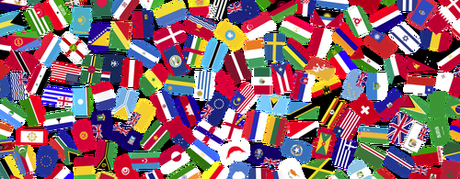 The biggest problem with democracy is, of course, that being oppressed by violent thugs enforcing bad, evil laws invented by self-serving sociopaths who win popularity contests isn’t really a lot different from being oppressed by violent thugs enforcing bad, evil laws invented by self-serving sociopaths who are descended from other self-serving sociopaths who were on the winning side of some war centuries ago. Without a solid constitution guaranteeing individual rights against a government whose powers are strictly enumerated, how the oppressor class justifies its tyranny is of little consequence to anyone who doesn’t have a say in the proceedings. After all, “democratic” American institutions approved of the claimed ownership of human beings until mid-19th century; the violent oppression of racial and ethnic minorities until the mid-20th century; the violent oppression of most sexual minorities until the beginning of the 21st century; and the violent oppression of some sexual minorities (not to mention the de facto violent oppression of some minority groups and the de jure oppression of others) to the present day. As a member of one of those groups, I can assure you that it’s cold comfort to know that the rapist thugs trying to destroy my life employ excuses made up by many power-mad busybodies rather than by a few power-mad busybodies, or that those busybodies were supposedly picked by “the people” than by a god or gods.
The biggest problem with democracy is, of course, that being oppressed by violent thugs enforcing bad, evil laws invented by self-serving sociopaths who win popularity contests isn’t really a lot different from being oppressed by violent thugs enforcing bad, evil laws invented by self-serving sociopaths who are descended from other self-serving sociopaths who were on the winning side of some war centuries ago. Without a solid constitution guaranteeing individual rights against a government whose powers are strictly enumerated, how the oppressor class justifies its tyranny is of little consequence to anyone who doesn’t have a say in the proceedings. After all, “democratic” American institutions approved of the claimed ownership of human beings until mid-19th century; the violent oppression of racial and ethnic minorities until the mid-20th century; the violent oppression of most sexual minorities until the beginning of the 21st century; and the violent oppression of some sexual minorities (not to mention the de facto violent oppression of some minority groups and the de jure oppression of others) to the present day. As a member of one of those groups, I can assure you that it’s cold comfort to know that the rapist thugs trying to destroy my life employ excuses made up by many power-mad busybodies rather than by a few power-mad busybodies, or that those busybodies were supposedly picked by “the people” than by a god or gods.
At one time, one’s religion was almost entirely determined by where one was born; Greeks followed the Greek religion, Egyptians the Egyptian religion, Chinese the Chinese religion, etc. Most people simply followed the religion they were born into, and the few who questioned it were, in general, either banished or violently murdered. But as humans started moving around more and even mixing with people who were born in different places, they became more tolerant of foreign religions; to be sure, there were still plenty of jihads, witch hunts, inquisitions and the like, but in the truly great cities a number of different religions might coexist with little friction. And in the modern world, most developed areas are home to people of at least several different religions, and many choose to have no religion at all. But while religion has thus developed to be less intrinsically tied to circumstances of birth than it was for most of human history, its twin sister nationality has barely developed at all. It was very easy for me to renounce Catholicism; I didn’t have to move or lose my friends or property, and the only social consequence was some disapproval from a few members of my family. And while it’s certainly true that renouncing religion is a lot harder than that in some places (for example, in some parts of the Muslim world), renouncing nationality is universally difficult (and sometimes virtually impossible). Renouncing Americanism would require me to lose my home, my friends, and many of my assets; I’d have to get used to different ways, possibly even learn a new language, and could look forward to being seen as an outsider in my new land for the rest of my life.
It doesn’t have to be this way; some political thinkers have proposed that government, which we conceive of as rigidly connected to a physical territory, could be as borderless as religion has largely become. People could choose a government as they can now choose a religion; they would be subject to that government’s laws and taxes (and reap whatever benefits it offered) just as they now are subject to the restrictions and tithes (and reap whatever benefits) of their chosen religion. No doubt most would stay with their nationality of birth, just as most people stick with their native religion; there would probably be large areas where most people belonged to one nationality or another, just as the majority of Brazilians are Catholic, the majority of Iraqis are Muslim and the majority of Indians Hindu. But nobody would be forced to uproot and lose everything merely to change government, and being stateless or anarchist would be no more difficult than being agnostic or atheist currently is in the Western world. If you want a different model of how this would work, consider insurance companies; nobody thinks it’s weird or threatening that their friends or neighbors pay premiums (taxes) to a different organization and have different benefits and limitations (laws) than they do. Want a nanny state that takes most of your income and has lots of laws but provides all kind of benefits? You can have that. You want a police state where armed goons watch you through cameras and then leap into action to “protect” you at the touch of a panic button? I’m sure some government will offer that. A theocracy? Sure, but your neighbors can still sin like crazy if they contract with a secular government. And naturally, some would choose no government at all.
Obviously there are a LOT of problems and complications with this idea; for example, mineral rights have long been divorced from the property under which they lie, but what about common resources like air and water? Treaties would need to be worked out for that. Roads and other civil engineering projects could be free to the citizens of the government or governments which built them, while others paid a toll (toll tags could parse this automatically). Violent crimes would probably be handled by the victim’s government, subject to whatever treaties & reciprocal agreements it had with the offender’s; violent crimes committed by anarchists would automatically be handled entirely by the government of the victim, thus providing an incentive for everyone to contract with some government, if only for legal protection in case a citizen of a “presumption of guilt” state decided to point at them. Governments could still require residence in a certain place if they wanted, just as certain cults do, and every government would maintain some capital territory in which its power was absolute (just like companies, universities, etc have their own campus rules and security forces). But in general, people would be free to choose the government that was right for them, and within a few centuries people would consider our current “You must obey us or die because you are within this set of imaginary lines” system as barbaric and monstrous as we consider forced religious conversion.
